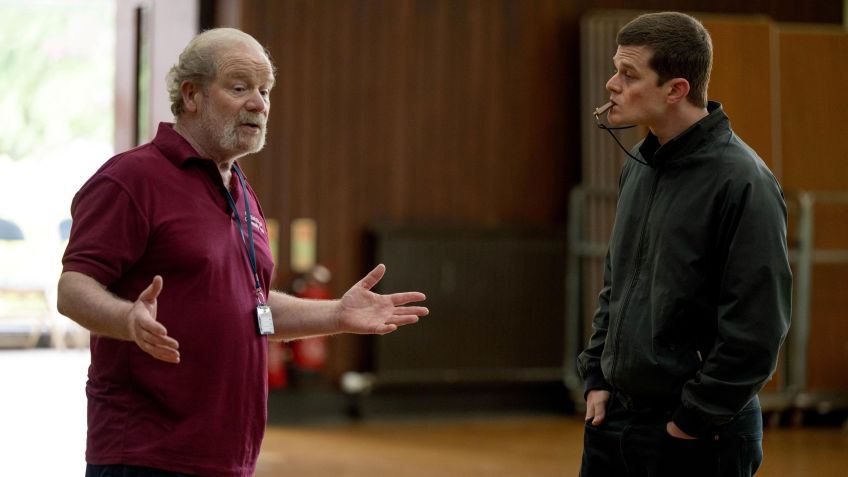Joyce Glasser reviews I Swear (October 10), cert 15, 121 mins.
Have you ever been in a large gathering where everyone is being respectfully silent and felt the urge to blurt out something? Maybe even something rude? What stops you from giving in to this subliminal temptation is a will power that, overnight, disappeared from John Davidson’s life.
Kirk Jone’s (Waking Ned, Nanny McPhee) biopic, I Swear, about the Tourette’s Syndrome campaigner John Davidson, is conventional and predictable.
We even know how the story ends because it opens with a flashback that, for many, will be a spoiler. Davidson, about to be knighted by the late Queen Elizabeth II, is struggling not to blurt out ‘F**k the Queen.’
Jones’s choices are not really spoilers, limitations or shortcomings. You can’t have the writer-director competing with a true story that is, in itself, so dramatic and emotionally robust that you don’t want embellishment.
In two remarkable performances, Scott Elis Watson (younger John) and Robert Aramayo (The Lord of the Rings: The Rings of Power, The King’s Man) portray John Davidson. Until the age of 15 he was a top student and athlete, was popular with girls and was his father David’s (Steven Cree) pride and joy.
When a football scout comes to Galashiels, a small town on the Scottish borders, to watch John play, David couldn’t be prouder, or more optimistic about his son’s promising future. But John has been feeling and acting weirdly and it’s affecting his football practice on the day the scout appears.

Struggling to read Yeats in class, John is dismissed by the teacher and told ‘to sort himself out.’ At home, his neurological movements, or “tics,” accompanied by spitting, and outbursts of expletives at dinner, upset his siblings and parents. John is banished to the living room floor to spit into the fire.
When John swears at the school principal, he predicts the unruly student will end up in prison. Instead of attempting to learn the cause of these uncharacteristic outbursts, the principal canes John’s hands, making it painful for him to touch the football. The football game watched by the scout is a complete disaster.
Eventually it gets too much for David, who abandons the family, while his conflicted wife, Heather, (Shirley Hendrickson) fails to cope and distances herself from her son for the sake of his siblings. John is left to cope on his own.
As he gets older and physically imposing, John’s spontaneous outbursts, unconscious hand movements and swearing are met with offense, anger and physical violence. In one scene John’s comments when a young woman walks by are taken the wrong way by the woman’s boyfriend who savagely beats the hapless John.
Distraught and helpless, John attempts suicide but is saved.
Thirteen years later, lonely and unemployable, John bumps into a former school friend, Murray (Francesco Piacentini-Smith) who is more intrigued than repelled by his friend’s condition and invites him for dinner. Murray’s mother, Dottie Achenbach (Maxine Peake), a former mental health nurse, is not only compassionate, but is living with a terminal cancer diagnosis.

Unlike John’s parents, Dottie is neither frustrated, disappointed nor overwhelmed by John’s illness and the two establish a bond. Dottie tells John he need never apologise. She becomes a surrogate mother and John moves into the Achenbach’s home.
When it is delivered, the Tourette’s diagnosis is both a life sentence and a relief. At least and at last there is a medical explanation for his actions. Dottie encourages John to read all about the condition, which in the 1980s, was not well known.
But it is when Dottie insists that John find a job that his life is transformed. Peter Mullan adds heart-warming humour to the story as Tommy Trotter, a community centre caretaker who lives alone with his beloved dog. Tommy, who is a bit of an outsider himself, takes a chance and hires John.
Impressed by the apprentice’s diligence, reliability and sociability, Tommy encourages John to speak out about his condition and educate his tormenters. Tommy is convinced that understanding will lead to acceptance.
John cannot change his fate, but he can change the way others treat him. Here’s where the film invites people who have Tourette’s to appear as extras. It seems Davidson accepted the decision to cast Aramayo (who bears a physical likeness to Davidson) in lieu of an actor with Tourette’s.
Aramayo and Peake worked together on the Beckett biopic Dance First, and their relationship in the film, based on living with their respective adversity, is beautifully and credibly portrayed. Any sentimentality is marginalised by the vividly dramatised misery and injustice of John’s misunderstood years and by his dogged determination to educate the world about a condition that affects one percent of the population.




